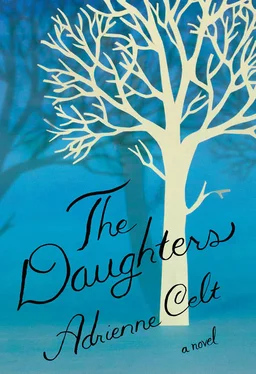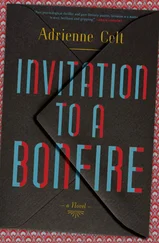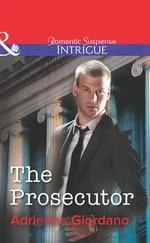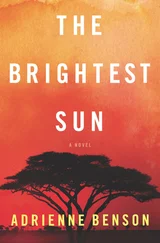The pitch of the argument had risen, apparently, until Ada tried to push her way into the area where the doctors were attending me. She was surprisingly strong for, as the nurse put it, a woman of a certain age .
Then it all happened at once. Perhaps she caught sight of my body, torn open, blood red. Perhaps she saw Kara and mistook the tubes and monitors for more than just precautions. There were shouts. She fell down. And though they tried to revive her, it was too late. No hand, no voice, could call her back.
My great-grandmother Greta made it a tradition in our family for the women to sing each new girl into life. Ada always said we were lending them our voices , which gave me a shiver, since my voice is everything. After all, it’s also been the tradition in our family for the singer, the mother, to lose something.
When I was a child, Ada was the one who steered me to sleep, past fear of oblivion, around monsters in the dark. Baba Ada with her pinned-back hair, Ada with her careful clothing. I remember how her hands seemed infallible to me, psychic: they knew where I would be the most ticklish, knew in which pocket I’d hidden an illicit treat. Ada studied opera from books so she could teach me. Pulled threads of knowledge out of the air just so she could stay one step ahead of the precocious girl in her charge.
And every night while my mother, Sara, robed herself in silk and went out to sing and sip whiskey in bars, or practiced jazz standards with a crackling record player in her bedroom — even after the day she went out and failed to come back again — Ada would tuck me soundly into bed and tell me stories of her own matka, Greta, the fierce Polish mother of us all.
Greta, Ada, Sara, Lulu. My lullaby, my lineage.
The Greta I heard about then was a young woman, ferociously proud of the fact that she never shrank from work. With her brown arms she rolled bread loaves, hauled lumber, spanked naughty children. She was equal to the challenge, so common in her time, of a woman’s double burden: family and field. She was formidable, tobacco-spitting, knuckle-handed, and when she kneaded bread in her kitchen she hummed. With a baby dandling, she hummed. And when called upon, she could sling a whole calf over her shoulder and bring it, puling, to the slaughterhouse with a song so low in her throat she might be mistaken for a growling bear, dragging her prey to its bloody end.
But there was also something uneasy about the Greta of my childhood, a hint of tragedy and lack. That was what made her so compelling: she had true love, she had power, and she traded it all for the prize of a daughter. Like the rusalka , poor wraith in the trees, Greta drained the life force from all that she loved in order to fill a yawning, indefinable need. According to my baba Ada, she made a deal with the devil. According to my mother, Greta’s crime was betrayal.
Whomever you listened to, though, it was clear: Greta brought us gifts, at a cost for which there’s no accounting. We were destined to daughters, and to giving something up. Ahead of time, we can’t know what.
Ada wanted me to sing to Kara and bring her in, bind her to our family’s stories. She believed in it quite sincerely, that act. That it tied us together, all the way back to Greta.
Picture the scene: a mother, flushed, serenading her infant. The girl, swaddled, drinking it in. Something passes between them like a bit of fire. You can’t see it, but you can feel the heat. They are both connected to something now, to the give and take of history. And it’s the mother’s singing that has done the job.
Did I believe? Certainly I thought it was a lovely tradition. Like a little religion we could hold in our throats. I agreed that Kara’s christening was the natural time to make an official show of the thing. That much I would give to Ada happily.
But now Ada is gone, and I think, Still just one step ahead of me? I look at Kara, sweet one, and I wonder. To bring her into the world I lost my grandmother. If I lend her my voice, can I trust her to give it back? Perhaps not. She might take it, and my life too, in the bargain. Without wanting them or knowing what to do with either.
I want to sing, more than anything. But. I am getting a new sense of the sacrifices required of me.
So I keep our apartment in a state of hospital silence even though John says it’s unsettling. Normally he allows me my privacies — if I want to wear green every day for a month, or develop a sudden aversion to dairy, he doesn’t make a fuss about it. Just cleans out the refrigerator, trashes the yogurt. After all, he has his own proclivities, which I allow in turn. But this, he claims, is different. I refuse to sing Kara lullabies. I don’t hum in the shower.
“I know what the doctor said.” Last night, before the storm rolled in, he leaned across the bed where we sprawled with Kara between us. “But she doesn’t understand you like I do. As long as we’ve known each other, you’ve never gone a week without singing. Maybe not a day. You’re going to blow some kind of gasket if you can’t rehearse.”
I let him stroke my tense jaw for a moment, then pulled away.
“Technically, I’m going to blow a gasket if I do.”
“You know what I mean, Lu.” John took his hand back. He looked annoyed, suspicious. I closed my eyes and rearranged my head on the pillow, unsure whether I was collecting my thoughts or feigning sleep.
“Yes,” I said. “I know what you mean.”
I thought about Kara’s baptism. The date chosen, the ceremony and the singing planned.
After a few minutes I peeked out at John from between my eyelashes and found him running the back of his fingers over Kara’s belly. His love for her is so strong that if I squint I can see it issuing off him in ultraviolet rays, a beatific suffusion of light. Part of me wants to take that love away from him right now to make things easier for all involved. He would be a good father. He is, in general, a good man. But it terrifies me to see that he’s ready to give her everything, when he doesn’t really owe her anything at all.
And it leaves me wondering: am I?
Until my mother disappeared when I was nine, the three of us — Ada, Sara, and I — shared an apartment in Ukrainian Village, a neighborhood of Chicago that has since been taken over by the young and the chic, walking their dogs. Then as now there was a Polish grocery store where Ada picked up items she found essential: spiced sausage, pickled herring, water carbonated by a spring in her hometown in Poznań. But in my memory, the differences between past and present are stronger than the similarities. Instead of twenty-three-year-olds with razor-cut hair, I remember the neighborhood porches populated by old men with piercing eyes, smoking cigarettes that they held, pinched, half an inch away from their mouths. The scraps of conversation that whipped by in the breeze were as likely to be in Polish or Russian as English, and the air smelled like wood varnish, and pickles, and wool.
This is where Ada chose to raise my mother, and then me. In an old world, hidden within the new.
I didn’t mind. What child minds a home when they know no other? My bedroom in the apartment was small, but it faced the yard. We didn’t have a remarkable garden, since it takes a special sort of madness to do much planting in Chicago, where the winter cold is obliterating and the ground can be covered in snow through April. But on summer nights I could look out the window and see lightning bugs skimming over the lawn. If I sat still, I could hear the murmuration of neighborhood cats as they stalked through the bushes, calling out to prey.
That window was also instrumental in one of my first conscious realizations about sound — that it changes depending on its environment. I must have been very young, maybe four years old, not yet in any formal training for my voice. But I was big enough to reach the window latch and raise the sash, and proud enough of my independence that I didn’t mind struggling a little bit to do so. I was singing something silly — a little do-re-me, a trill, a scale. I had to shove the weight of my shoulder underneath the sash to get the right height, and when I did I was thrilled with myself: I stuck my head outside and bellowed my song into the open air.
Читать дальше












